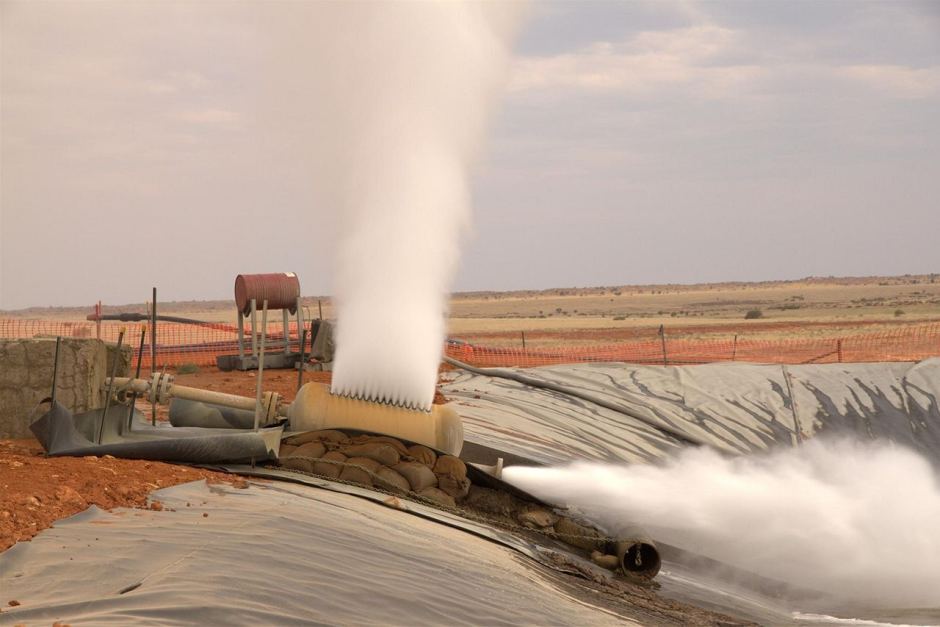Category: Geothermal Energy / Alternative Energy / Environment / Company News / Electricity Energy and Utilities / Business, Economics and Finance / Industry / University and Further Education
Geothermal power tests abandoned in outback SA
Tuesday, 30 Aug 2016 14:45:36 | Tom Fedorowytsch

Geodynamics achieved small-scale electricity generation at its Cooper Basin sites. (Supplied: Geodynamics)
A potential energy source in Australia is set to remain untapped, with a geothermal power project in the far north of South Australia now closed.
Energy company Geodynamics closed and remediated the sites of several test wells and generation plants in the Cooper Basin after deciding they were not financially viable.
Before the closure, the company had managed to extract super-heated water from five kilometres below the earth's surface and use it to generate small amounts of electricity.
"The technology worked but unfortunately the cost of implementing the technology and also the cost of delivering the electricity that was produced to a market was just greater than the revenue stream that we could create," Geodynamics chief executive Chris Murray said.
Professor Martin Hand ran the South Australian Centre for Geothermal Energy Research at the University of Adelaide.
"I think it was talked up too much — it's a very nice concept on the front page of a newspaper, looks very easy to do, and I think it was over-spruiked," he said.
Professor Hand said large areas of the Earth's crust across Australia were very hot and could be ideal for use as a non-conventional energy source.
"Rocks about five kilometres below the surface are at temperatures of around 240 to 250 degrees and, in principle, if water could be circulated through those rocks it could be returned to the surface to produce geothermal power in a power plant," he said.
He pointed out Australian geothermal energy differed greatly from the energy created by abundant and accessible steam vents in countries such as New Zealand and Iceland.
"There are 46 countries around the world that generate significant geothermal energy, but all of those come from conventional systems — where you see the geysers and all the volcanic manifestation, where there is natural permeability in the ground," Professor Hand said.
Geodynamics now talks of a brighter future for bio-gas, the recycling of farm waste and methane for electricity production.
"Not only does it reduce the greenhouse gases of a facility, but it provides renewable energy," Mr Murray said.
South Australia's Conservation Council is keen to see more public investment in geothermal energy and other renewable energy sources.
"There's no doubt that a lot of these start-up, new sources of energy will require public funding to give them a start and, what we've found is, as soon as that happens the cost curve quickly reduces," chief executive Craig Wilkins said.
Professor Hand made a similar call.
"If we could see [geothermal] as some kind of national resource, and therefore it's some kind of national research project, there is a vast amount of energy that could be potentially unlocked."
 Photo:
Iceland has easy access to the heat needed for geothermal power generation. (ABC News: Tom Fedorowytsch)
Photo:
Iceland has easy access to the heat needed for geothermal power generation. (ABC News: Tom Fedorowytsch)
- About Us
- |
- Terms of Use
- |
-
 RSS
RSS - |
- Privacy Policy
- |
- Contact Us
- |
- Shanghai Call Center: 962288
- |
- Tip-off hotline: 52920043
- 沪ICP证:沪ICP备05050403号-1
- |
- 互联网新闻信息服务许可证:31120180004
- |
- 网络视听许可证:0909346
- |
- 广播电视节目制作许可证:沪字第354号
- |
- 增值电信业务经营许可证:沪B2-20120012
Copyright © 1999- Shanghai Daily. All rights reserved.Preferably viewed with Internet Explorer 8 or newer browsers.




 Send to Kindle
Send to Kindle